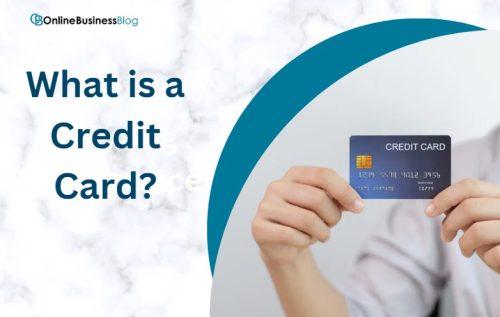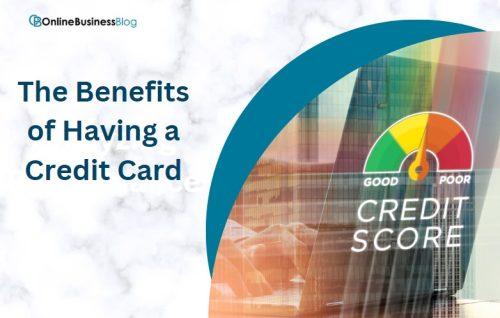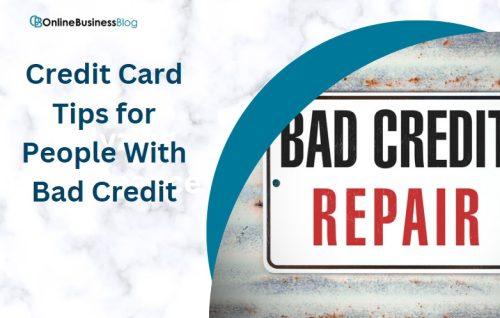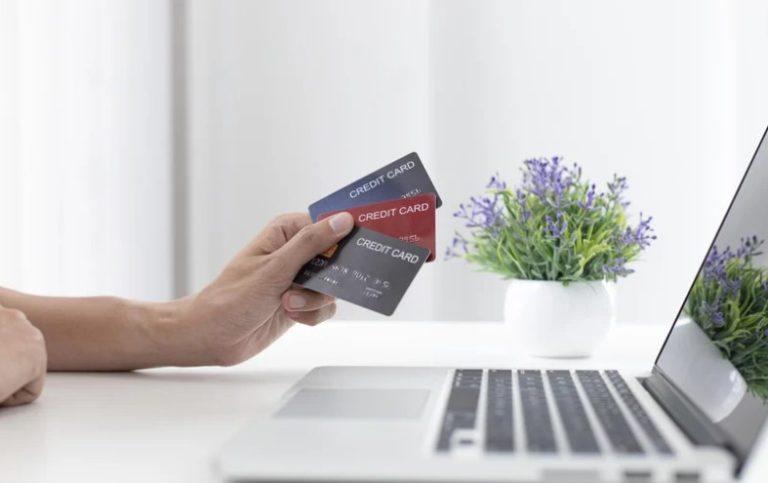Post Contents
Are you struggling to get approved for a credit card because of your bad credit history? Don’t worry, you’re not alone. Many people have been in your shoes before and have found ways to get the credit they need despite their less-than-perfect scores. In fact, having a credit card can actually be beneficial for rebuilding your credit over time. So if you’re ready to learn how to get a credit card with bad credit, keep reading! We’ll be sharing some tips and tricks that may just work for you.
What is a Credit Card?

A credit card is a powerful financial tool that allows you to buy now and pay later. When you make purchases with your credit card, the issuer lends you money that you promise to repay based on the terms of your agreement. These agreements typically include things like interest rates, fees, and payment due dates.
Credit cards can be used for many different types of transactions including online shopping, grocery store purchases, dining out at restaurants, and even paying bills. They come with various rewards programs such as cashback or points that can be redeemed for travel or merchandise.
While credit cards offer many benefits, they also come with risks if not managed properly. Interest rates can be high and late payments or missed payments can damage your credit score. It’s important to use them responsibly by making timely payments in full every month.
A credit card is a financial tool that can help improve your purchasing power but must be used wisely to avoid any potential setbacks in managing debt.
How Do Credit Cards Work?
Credit cards are payment tools that allow users to borrow money from a financial institution. They work by providing users with a line of credit, which can be used to make purchases or withdraw cash advances. When you use your credit card to buy something, the issuer pays on your behalf and you agree to repay the amount borrowed.
Each time you use a credit card for a purchase, it is recorded as an outstanding balance on your account. You will be required to pay back this balance within a certain period of time called the grace period. If you don’t pay off your balance in full during this period, the credit card interest will accrue and increase the total money owed on your account.
Credit cards also come with various fees such as annual fees, late payment fees and foreign transaction fees among others. These charges can add up quickly if not managed well.
To keep track of how much money has been spent using a credit card, issuers provide monthly statements detailing all transactions made during that billing cycle along with any applicable charges and interest accrued.
Understanding how credit cards work is essential for responsible usage since they play an important role in shaping one’s overall financial well-being.
The Benefits of Having a Credit Card

Having a credit card can provide numerous benefits for those who use it responsibly.
- One of the main advantages is the ability to build your credit score, which can be crucial when applying for loans or mortgages in the future.
- Credit cards also offer convenience and flexibility. You don’t need to carry cash with you at all times, and you can make purchases online or over the phone without any hassle. Additionally, many credit cards come with rewards programs that allow you to earn points or cash back on your purchases.
- Another benefit of having a credit card is increased security. If your card is lost or stolen, most issuers have fraud protection policies in place that limit liability for unauthorized charges.
- Having a credit card can help establish financial responsibility and discipline. Making regular payments on time and staying within your spending limits demonstrates good habits to lenders and potential employers.
While there are certain risks associated with using credit cards irresponsibly, taking advantage of their benefits can greatly improve your financial situation in the long run.
The Downside of Having a Credit Card
While credit cards offer a lot of convenience and benefits, there are also downsides to having one. For starters, if you don’t pay your balance in full every month, you’ll be charged interest on the remaining balance. This can quickly add up and put you into debt.
Another downside is that it’s easy to overspend with a credit card. Since there’s no physical exchange of money involved like with cash or debit cards, it can be tempting to make purchases without really thinking about whether or not you can afford them.
Credit cards also come with fees such as annual fees, late payment fees and foreign transaction fees. These charges can eat away at any rewards or perks that come with the card.
Having too many credit cards or maxing out your available credit limit can negatively impact your credit score. This makes it harder for you to get approved for loans in the future and could result in higher interest rates.
While credit cards have their advantages, it’s important to use them responsibly and consider all of the potential downsides before applying for one.
How to Get a Credit Card With Bad Credit?

Getting a credit card with bad credit can be challenging, but it’s not impossible. Here are some steps you can take to increase your chances of obtaining a credit card despite having a poor credit history:
- Assess Your Credit Situation: Start by checking your credit report and understanding the factors contributing to your bad credit. Look for any errors or inaccuracies that can be disputed and resolved.
- Consider Secured Credit Cards: Secured credit cards are specifically designed for individuals with bad credit. They require a security deposit that serves as collateral for your credit limit. By using a secured credit card responsibly and making timely payments, you can gradually rebuild your credit.
- Research Credit Card Options: Look for credit cards specifically tailored for individuals with bad credit. Some credit card issuers offer cards that are more accessible to people with low credit scores. Compare their terms, fees, and interest rates to find the most suitable option.
- Explore Store Credit Cards or Subprime Credit Cards: Store credit cards and subprime credit cards may be easier to obtain even with bad credit. However, be cautious as they often come with higher interest rates and fees. Make sure to read the terms and conditions carefully before applying.
- Apply for a Co-Signer or Authorized User: If possible, consider applying for a credit card with a co-signer or becoming an authorized user on someone else’s credit card. This can provide you with access to credit and potentially improve your credit history if used responsibly.
- Build a Positive Payment History: Regardless of the credit card option you choose, the key to improving your credit is to make timely payments and demonstrate responsible credit behaviour. Pay your bills on time, keep your credit utilization low, and avoid accumulating unnecessary debt.
- Seek Professional Advice: If you’re struggling with bad credit, consider consulting with a credit counselling agency or financial advisor. They can provide personalized guidance and help you develop a plan to rebuild your credit.
Remember, rebuilding credit takes time and patience. By implementing responsible credit habits and using credit wisely, you can gradually improve your credit score and increase your chances of qualifying for better credit card offers in the future.
Credit Card Tips for People With Bad Credit

If you have bad credit, getting approved for a credit card can be challenging. However, there are ways to improve your chances of approval and responsibly manage your credit card.
Here are some tips:
- Apply for secured credit cards: Secured credit cards require a security deposit that becomes the credit limit. This is an excellent option to build or rebuild your credit score.
- Consider becoming an authorized user on someone else’s account: You can ask someone with good standing in their account history to add you as an authorized user on their account.
- Pay off balances each month on time: Making payments regularly shows lenders that you are responsible and reliable enough to return borrowed money.
- Keep low utilization rates: Try not to use more than 30% of your available balance, which means if your limit is $1,000 only spend up to $300 per billing cycle.
- Monitor your spending: Track expenses using apps like Mint or Personal Capital so that you don’t overspend and accrue debts.
By following these tips, you’ll increase the likelihood of approval when applying for a new line of credit while slowly building up trust with lenders over time by showing responsible financial behaviour
Conclusion
Getting a credit card with bad credit may seem daunting, but it is definitely possible. By following the tips outlined in this article and being responsible with your spending habits, you can improve your credit score over time.
Remember to always do your research before applying for a credit card and choose one that best suits your needs. Don’t be discouraged by rejection and keep working towards building a strong financial foundation.
Having good credit opens up opportunities for better interest rates on loans, mortgages, and other financial products. So start taking steps today to get yourself back on track towards a healthier financial future.
FAQS on how to get a credit card with bad credit
1. What is the easiest card to get with bad credit?
In the UK, some credit cards are designed specifically for individuals with poor credit. The Aqua Classic and Vanquis Credit Builder cards are known to be more accessible to those with bad credit. These cards often have higher interest rates and lower credit limits, but they can help you rebuild your credit when used responsibly.
2. Can I get a credit card if my credit score is poor?
Yes, it is still possible to get a credit card with a poor credit score in the UK. As mentioned earlier, there are credit cards tailored for individuals with bad credit. However, it’s important to note that your options may be limited, and you might have to apply for cards with higher interest rates and fees. Responsible usage of such cards can help you improve your credit over time.
3. Can I get a credit card with a 300 credit score?
A credit score of 300 is considered extremely poor in the UK, and it can significantly limit your options. While it may be challenging to get approved for a traditional credit card with such a low score, some credit-building cards may still be available. However, it’s advisable to work on improving your credit before applying for credit cards, as higher credit scores will offer better chances of approval and more favourable terms.
4. Which credit card is easily available?
Credit card availability can vary based on individual circumstances and credit history. However, credit cards specifically designed for individuals with poor credit, such as Aqua Classic, Vanquis Credit Builder, and Capital One Classic, are generally more accessible. These cards often have straightforward application processes and are designed to help you build or rebuild your credit history.


